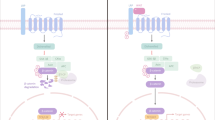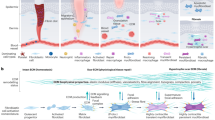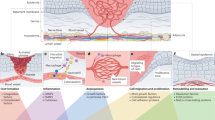Abstract
Angiogenesis does not only depend on endothelial cell invasion and proliferation: it also requires pericyte coverage of vascular sprouts for vessel stabilization1,2. These processes are coordinated by vascular endothelial growth factor (VEGF) and platelet-derived growth factor (PDGF) through their cognate receptors on endothelial cells and vascular smooth muscle cells (VSMCs), respectively3,4. PDGF induces neovascularization by priming VSMCs/pericytes to release pro-angiogenic mediators5,6,7. Although VEGF directly stimulates endothelial cell proliferation and migration, its role in pericyte biology is less clear. Here we define a role for VEGF as an inhibitor of neovascularization on the basis of its capacity to disrupt VSMC function. Specifically, under conditions of PDGF-mediated angiogenesis, VEGF ablates pericyte coverage of nascent vascular sprouts, leading to vessel destabilization. At the molecular level, VEGF-mediated activation of VEGF-R2 suppresses PDGF-Rβ signalling in VSMCs through the assembly of a previously undescribed receptor complex consisting of PDGF-Rβ and VEGF-R2. Inhibition of VEGF-R2 not only prevents assembly of this receptor complex but also restores angiogenesis in tissues exposed to both VEGF and PDGF. Finally, genetic deletion of tumour cell VEGF disrupts PDGF-Rβ/VEGF-R2 complex formation and increases tumour vessel maturation. These findings underscore the importance of VSMCs/pericytes in neovascularization8,9 and reveal a dichotomous role for VEGF and VEGF-R2 signalling as both a promoter of endothelial cell function and a negative regulator of VSMCs and vessel maturation.
This is a preview of subscription content, access via your institution
Access options
Subscribe to this journal
Receive 51 print issues and online access
$199.00 per year
only $3.90 per issue
Buy this article
- Purchase on Springer Link
- Instant access to full article PDF
Prices may be subject to local taxes which are calculated during checkout




Similar content being viewed by others
References
Carmeliet, P. Angiogenesis in life, disease and medicine. Nature 438, 932–936 (2005)
Andrae, J. et al. Role of platelet-derived growth factors in physiology and medicine. Genes Dev. 22, 1276–1312 (2008)
Ferrara, N., Gerber, H. P. & LeCouter, J. The Biology of VEGF and its receptors. Nature Med. 9, 669–676 (2003)
Inui, H. et al. Differences in signal transduction between platelet-derived growth factor (PDGF) alpha and beta receptors in vascular smooth muscle cells. PDGF-BB is a potent mitogen, but PDGF-AA promotes only protein synthesis without activation of DNA synthesis. J. Biol. Chem. 269, 30546–30552 (1994)
Vincent, L. & Rafii, S. Vascular frontiers without borders: multifaceted roles of platelet-derived growth factor (PDGF) in supporting postnatal angiogenesis and lymphangiogenesis. Cancer Cell 6, 307–309 (2004)
Pietras, K. et al. Functions of paracrine PDGF signaling in the proangiogenic tumor stroma revealed by pharmacological targeting. PLoS Med. 5, e19 (2008)
Jechlinger, M. et al. Autocrine PDGFR signaling promotes mammary cancer metastases. J. Clin. Invest. 116, 1561–1570 (2006)
Song, S. et al. PDGFRβ+ perivascular progenitor cells in tumours regulate pericyte differentiation and vascular survival. Nature Cell Biol. 7, 870–879 (2005)
Lindahl, P., Johansson, B. R., Leveen, P. & Betsholtz, C. Pericyte loss and microaneurysm formation in PDGF-B-deficient mice. Science 11, 242–245 (1997)
Nissen, L. J. et al. Angiogenic factors FGF-2 and PDGF-BB synergistically promote murine tumor neovascularization and metastasis. J. Clin. Invest. 117, 2766–2777 (2007)
Abramsson, A., Lindblom, M. & Betsholtz, C. Endothelial and nonendothelial sources of PDGF-B regulate pericyte recruitment and influence vascular pattern formation in tumors. J. Clin. Invest. 112, 1142–1151 (2003)
Sennino, B. et al. Sequential loss of tumor vessel pericytes and endothelial cells after inhibition of PDGF-B by selective aptamer AX102. Cancer Res. 67, 7358–7367 (2007)
Kim, K. J. et al. Inhibition of vascular endothelial growth factor-induced angiogenesis suppresses tumour growth in vivo. Nature 362, 841–844 (1993)
Hirschi, K. K. et al. Endothelial cells modulate the proliferation of mural cell precursors via platelet-derived growth factor-BB and heterotypic cell contact. Circ. Res. 84, 298–305 (1999)
Hirschi, K. K. et al. PDGF, TGF-β, and heterotypic cell-cell interactions mediate endothelial cell-induced recruitment of 10T1/2 cells and their differentiation to a smooth muscle fate. J. Cell Biol. 141, 805–814 (1998)
Morikawa, S. et al. Abnormalities in pericytes on blood vessels and endothelial sprouts in tumors. Am. J. Pathol. 160, 985–1000 (2002)
Jain, R. K. Normalization of tumor vasculature: an emerging concept in antiangiogenic therapy. Science 307, 58–62 (2005)
Willett, C. G. et al. Direct evidence that the VEGF-specific antibody bevacizumab has antivascular effects in human rectal cancer. Nature Med. 2, 145–147 (2004)
Grunstein, J. et al. Tumor-derived expression of vascular endothelial growth factor is a critical factor in tumor expansion and vascular function. Cancer Res. 23, 2800–2810 (2004)
Eliceiri, B. et al. Selective requirement for Src kinases during VEGF-induced angiogenesis and vascular permeability. Mol. Cell 4, 915–924 (1999)
Alavi, A. et al. Chemoresistance of endothelial cells induced by basic fibroblast growth factor depends on Raf-1-mediated inhibition of the proapoptotic kinase, ASK1. Cancer Res. 6, 2766–2772 (2007)
Fong, T. A. T. et al. SU-5416 is a potent and selective inhibitor of the vascular endothelial growth factor receptor (Flk-1/KDR) that inhibits kinase catalysis, tumor vascularization, and growth of multiple tumor types. Cancer Res. 59, 99–106 (1999)
Klemke, R. L. et al. Regulation of cell motility by mitogen-activated protein kinase. J. Cell Biol. 137, 481–492 (1997)
Luo, J. et al. A protocol for rapid generation of recombinant adenoviruses using the AdEasy system. Nature Protoc. 2, 1536–1547 (2007)
Söderberg, O. et al. Direct observation of individual endogenous protein complexes in situ by proximity ligation. Nature Methods 3, 995–1000 (2006)
Jarvius, M. et al. In situ detection of phosphorylated platelet-derived growth factor receptor β using a generalized proximity ligation method. Mol. Cell. Proteomics 6, 1500–1509 (2007)
Amoh, Y. et al. Hair-follicle-derived blood vessels vascularize tumors in skin and are inhibited by doxorubicin. Cancer Res. 65, 5352–5357 (2005)
Acknowledgements
We thank D. Stupack and D. Schlaepfer for advice and review of the manuscript. We also thank A. Tomar for assistance with the PLA imaging; C. Heldin for the PDGF-Rβ complementary DNA; and J. Desgrosellier for processing pancreatic tumour samples. This work was supported by National Institutes of Health grants R37-CA50286 (D.A.C.) and CA082515 (R.S.J.), and by a University of California Academic Senate Grant (N.A.). C.S. was funded by the Deutsche Forschungsgemeinschaft (DFG STO 787/1-1), and L.M.A. received an Institutional Research and Academic Career Development Award postdoctoral fellowship (National Institutes of Health grant GM 68524).
Author Contributions J.I.G. generated mutant receptors, performed biochemical and cell imaging analyses, and prepared the manuscript. D.J.S. and E.M. assisted with experiments and manuscript preparation. S.G.B. performed angiogenesis assays. L.M.A. assisted with adenovirus production, cell isolation and tumour staining. J.H. and L.S. performed RNA analysis and assisted with biochemical analyses. C.S. and R.S.J. generated, implanted and harvested fibrosarcomas. D.A.C. and N.A. supervised and directed the project.
Author information
Authors and Affiliations
Corresponding author
Supplementary information
Supplementary Information
This file contains Supplementary Figures 1-12 with Legends (PDF 7521 kb)
Rights and permissions
About this article
Cite this article
Greenberg, J., Shields, D., Barillas, S. et al. A role for VEGF as a negative regulator of pericyte function and vessel maturation. Nature 456, 809–813 (2008). https://doi.org/10.1038/nature07424
Received:
Accepted:
Published:
Issue Date:
DOI: https://doi.org/10.1038/nature07424
This article is cited by
-
Image-based modeling of vascular organization to evaluate anti-angiogenic therapy
Biology Direct (2023)
-
Inhibition of PDGFRβ alleviates endothelial cell apoptotic injury caused by DRP-1 overexpression and mitochondria fusion failure after mitophagy
Cell Death & Disease (2023)
-
Angiogenic signaling pathways and anti-angiogenic therapy for cancer
Signal Transduction and Targeted Therapy (2023)
-
The Active Role of Pericytes During Neuroinflammation in the Adult Brain
Cellular and Molecular Neurobiology (2023)
-
Anticancer potential of oroxylin A: from mechanistic insight to synergistic perspectives
Naunyn-Schmiedeberg's Archives of Pharmacology (2023)
Comments
By submitting a comment you agree to abide by our Terms and Community Guidelines. If you find something abusive or that does not comply with our terms or guidelines please flag it as inappropriate.



